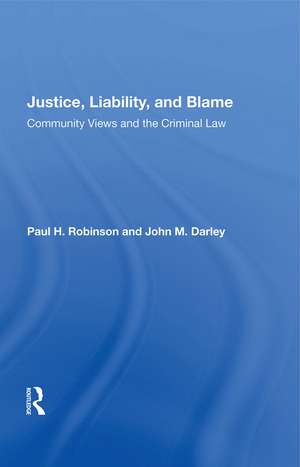Justice, Liability, and Blame: Community Views and the Criminal Law
Autor Paul H. Robinsonen Limba Engleză Hardback – 7 iun 2019
| Toate formatele și edițiile | Preț | Express |
|---|---|---|
| Paperback (1) | 389.38 lei 6-8 săpt. | |
| Taylor & Francis – 7 dec 2020 | 389.38 lei 6-8 săpt. | |
| Hardback (1) | 769.72 lei 6-8 săpt. | |
| Taylor & Francis – 7 iun 2019 | 769.72 lei 6-8 săpt. |
Preț: 769.72 lei
Preț vechi: 1030.64 lei
-25% Nou
Puncte Express: 1155
Preț estimativ în valută:
147.28€ • 154.19$ • 121.87£
147.28€ • 154.19$ • 121.87£
Carte tipărită la comandă
Livrare economică 07-21 aprilie
Preluare comenzi: 021 569.72.76
Specificații
ISBN-13: 9780367009953
ISBN-10: 0367009951
Pagini: 326
Dimensiuni: 152 x 229 mm
Greutate: 0.76 kg
Ediția:1
Editura: Taylor & Francis
Colecția Routledge
Locul publicării:Oxford, United Kingdom
ISBN-10: 0367009951
Pagini: 326
Dimensiuni: 152 x 229 mm
Greutate: 0.76 kg
Ediția:1
Editura: Taylor & Francis
Colecția Routledge
Locul publicării:Oxford, United Kingdom
Cuprins
Preface -- Community Standards and the Criminal Law -- Doctrines of Criminalization: What Conduct Should Be Criminal? -- Doctrines of Justification: When Should It Be Lawful for One to Engage in Conduct That Normally Would Constitute a Violation? -- Doctrines of Culpability: When Is One’s Violation of a Legal Rule Blameworthy? -- Doctrines of Excuse: When Is One’s Rule Violation Blameless? -- Doctrines of Grading: What Degree of Punishment Is Deserved for One’s Blameworthy Violation? -- Conflict Between Community Views and Criminal Codes -- Research Methodology -- Text of Stimulus Instrument Scenarios -- Liability Score/Imprisonment Term Translation Table
Descriere
Drafters of legal codes often implicitly or explicitly seek to incorporate community standards. To what extent have they succeeded? This book examines shared intuitive notions of justice among laypersons and compares the discovered principles to those instantiated in current American criminal codes. After discussion of the proper role of community views in formulating legal doctrine, Robinson and Darley report eighteen original studies on a wide range of issues in dispute among legal theorists. The authors compare lay intuitions and code provisions on such questions as the justified use of force, insanity, causation, complicity, risk-creation, omission liability, culpability requirements, duress, entrapment, multiple offenses, and criminalization matters such as felony-murder and sexual offenses. Many important differences between the legal code and community views are found, and the authors discuss the implications of those differences. One implication is the possibility that such conflicts could lead to reduced compliance as the code loses its moral authority with the community.
